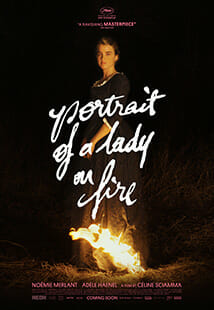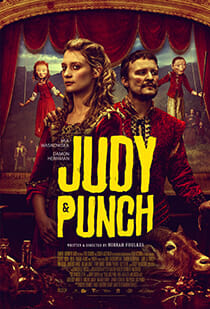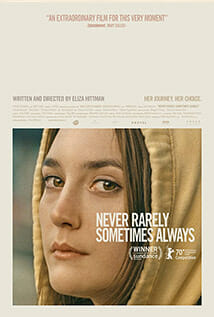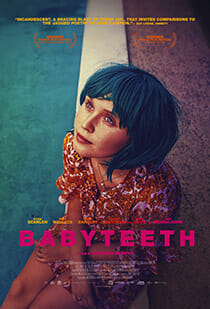Films by Women: Five Movies to Watch from June (2020)

The “52FilmsByWomen” hashtag isn’t a new invention, but in the last few years it’s gained increasingly urgent relevance. Created and disseminated by Women in Film, a nonprofit outlet established to “achieve parity and transform culture,” the tag translates into a simple pledge: Watch one movie directed by a woman each week for an entire year. Most years, completing that pledge would be the least one could do. Today, it’s a means of pushing back against rampant gender bias in the film industry.
To help those interested in putting their viewing habits to good use, Paste is highlighting some of June’s best new movies directed by women to view at home:
Portrait of a Lady on Fire Release: June 23, 2020 (Criterion Blu-ray)
Release: June 23, 2020 (Criterion Blu-ray)
Director: Céline Sciamma
Stars: Noémie Merlant, Adèle Haenel, Luàna Bajrami
Genre: Drama, Romance
Rating: R
Runtime: 119 minutes
French director Céline Sciamma’s Portrait of a Lady on Fire revels in the far-reaching history of women—their relationships, their predicaments, the unrelenting bond that comes with feeling uniquely understood—while also grappling with the patriarchal forces inherent in determining the social mores that ultimately restrict their agency. The film, which takes place sometime before the French Revolution in the late 18th century, introduces us to Marianne (Noémie Merlant), an artist commissioned to paint the portrait of an aristocratic young woman named Heloïse (Adèle Hannel), which, once completed, will be sent to Milan—where her suitor will covet it until his betrothed arrives. Completely resistant to the idea of marriage, Heloïse has sabotaged previous attempts, leaving Marianne with a difficult assignment. She must not reveal to Heloïse that she has been tasked with painting her, instead posing as a companion for afternoon walks, memorizing the details of Heloïse’s features and toiling on the portrait in secret. The class distinctions between Marianne and Heloïse point to an interesting exploration of the power dynamics at play within the muse/artist dichotomy, but even more beguiling about the relationship is that it is somewhat emblematic of Sciamma’s relationship with Hannel—the two publicly announced their relationship in 2014, amicably separating shortly before the filming of Portrait. Take another recent film that draws from a director’s real-life romantic relationship, Paul Thomas Anderson’s Phantom Thread. Loosely based on Anderson’s marriage to Maya Rudolph, the film, although subverting many clichés of depicting artist/muse relationships, ultimately concludes with the power dynamic intact. Sciamma has no interest in following the oft-petty conflicts between creative types and their romantic partners, instead opting to present a bigger picture of a relationship forged out of the climactic act of knowing another person, not just feeling inspired by what they mean for one’s art. —Natalia Keogan
Judy & Punch Release Date: June 5, 2020
Release Date: June 5, 2020
Director: Mirrah Foulkes
Stars: Mia Wasikowska, Damon Herriman, Lucy Honigman, Benedict Hardie
Genre: Drama, Comedy
Rating: NR
Runtime: 106 minutes
There’s a texture in Mirrah Foulkes’ Judy & Punch suggesting Guillermo del Toro, an off-kilter whimsy suggesting Terry Gilliam and a throughline of feminine vengeance suggesting a majority of the work Mia Wasikowska has done throughout her career. Flipping the old English marionette play Punch & Judy about, the film lays its eyes on Judy (Wasikowska), the dutiful but long-suffering wife and partner to her drunkard husband, Punch (Damon Herriman), proclaimed a genius by his audience and by himself. He is, as first introduced, not the worst, but over time makes the decision to become the worst through indulgence of his own reputation, not to mention too much alcohol. His ego and stupidity leads to the death of his and Judy’s baby, which is a warning to parents: Don’t watch this movie if that kind of thing gives you the queasies.
Punch also beats Judy within an inch of her life, and after being nursed back to health by exiles from the town of Seaside, which is nowhere near a sea, she sets out for blood. The set-up is more satisfying than the climax, which is, disappointingly, mostly bloodless, but what a deliciously grim time Foulkes has until then. Judy & Punch has a lived-in sense of identity, as if its author shot on location at a shitty old renaissance-era English hamlet, where mob rule is law and people are generally awful out of habituation. The way Foulkes uses subversion to both pick apart the cultural value of the old stage show, and also to explore the horror and tragedy of Punch’s misogyny, is darkly pleasing, though the film doesn’t quite stick the landing.Regardless, what she achieves beforehand is compelling enough to make a good case for Foulkes’ future. —Andy Crump
Shirley Release Date: June 5, 2020
Release Date: June 5, 2020
Director: Josephine Decker
Stars: Elisabeth Moss, Odessa Young, Michael Stuhlbarg, Logan Lerman
Genre: Drama, Comedy
Rating: R
Runtime: 107 minutes
The opening scene of Shirley sets the stage for the kind of women we can expect to take us on this strange, seductive journey. And even in a time where I’m pretty sure we need to abolish both the police and white people as a whole, I found myself excited by a young white woman named Rose, sometimes called Rosie (Odessa Young). Riding the train. Engrossed in a New Yorker story called “The Lottery.” She gets to the ending, and breathlessly tells her husband Fred (Logan Lerman) how it went down. How a woman was stoned to death by an entire town—and her own children, too. Her husband is repulsed, and because Rose is a gorgeous white woman with a stunning red lip, and those sweet, wavy 1950s curls, we expect her to be repulsed as well. But she’s not. She’s fascinated, thrilled, horrified…and turned on. ‘Okay,’ I thought to myself, as Rosie, high off Shirley Jackson’s haunting story, fucks her husband in the train bathroom. “You got me. I’m in.” And I was still in, as I’m sure you were, when we, along with Rose and her husband, make it to the home of horror author Shirley Jackson (Elisabeth Moss), where Jackson and her husband, Stanley (Michael Stuhlbargh, incredible as always), are holding court and celebrating the author’s latest work.
Moss’s performance doesn’t always land perfectly in Shirley, but as a duo, she and Stuhlbarg are engaging to watch. It’s even more true for the duo of Shirley and Rose, who meet at the party, where Rose introduces herself as the wife of Stanley’s new assistant. Shirley, a curmudgeon disinterested in all manner of small talk, and seemingly unimpressed with anyone in her fanbase, tries to wave her off. But Rose won’t have it; she’s not like the other girls, the other casual fans of Shirley’s work. (And after that opening scene, we believe her.) She’s different, she promises Shirley. It’s a promise made by the film, too. And it’s a promise that isn’t completely honored. —Shannon M. Houston
Never Rarely Sometimes Always Release Date: June 9, 2020 (Blu-ray)
Release Date: June 9, 2020 (Blu-ray)
Director: Eliza Hittman
Stars: Sidney Flanigan, Talia Ryder, Sharon Van Etten, Ryan Eggold
Genre: Drama
Rating: NR
Runtime: 95 minutes
I keep thinking about the suitcase: Skylar (Talia Ryder) packs sweaters and a pair of jeans into an oversized travel bag (oversized, at least, for what is supposed to be a day-long trip). The next morning, Skylar and her cousin Autumn (Sidney Flanigan) board a bus from their hometown in rural Pennsylvania to New York City. When they get to Manhattan, the cousins take turns carrying the large bag, guarding it, rolling it on the sidewalk, lugging it up and down steep subway stairs. The pair has carefully planned a trip to New York so that Autumn can get an abortion without her mom (Sharon Van Etten) and stepdad (Ryan Eggold) knowing, since Pennsylvania requires parental consent for the procedure. The bag is the burden they carry; Never Rarely Sometimes Always—in emotive close ups, creating intimacy as if the viewer gets a chance to see the world through Autumn’s often solemn, stoic gaze—chronicles Autumn’s tortuous and convoluted path just to take agency over her body, studying the patience and perseverance that women often need to navigate the world. It’s a film punctuated by waiting, for one appointment or the other, or for the promise of safety. There are, however, brief moments that remind audiences that Autumn and Skylar are just kids—playing arcade games, or enjoying the thrill of an unfamiliar city—and these scenes, provide, at least, glimmers of respite or perhaps windows into what life could be if like if they didn’t have to work so hard for bodily autonomy. —Isabella Bridie DeLeo
Babyteeth Release Date: June 19, 2020
Release Date: June 19, 2020
Director: Shannon Murphy
Stars: Eliza Scanlen, Essie Davis, Ben Mendelsohn, Toby Wallace
Genre: Drama, Comedy
Rating: NR
Runtime: 117 minutes
If Josh Boone’s The Fault in Our Stars had several drug addictions, plus an overwhelming need for family therapy, it’d read like distant kin to Babyteeth, Australian filmmaker Shannon Murphy’s feature debut. Babyteeth files under the “sick teenager” romantic dramedy sub-genre, being the story of Milla Finlay (Eliza Scanlen), a high school student struggling through youth with cancer while living with her overmedicated basket case mom, Anna (Essie Davis), and her emotionally remote psychiatrist dad, Henry (Ben Mendelsohn). Add into that dynamic the arrival of Moses (Toby Wallace), who parts the Finlay’s woes with all the grace of a caroming meteor. Babyteeth orbits the danger baked into Milla’s infatuation with Moses, which of course blooms into genuine fancy between them. He’s chaos incarnate with a rat tail and a face tattoo, but he clearly digs her, so she digs him back. The feelings that each has for the other are so baldly recognizable that Anna and Henry reluctantly allow the courtship to progress. “This is the worst possible parenting I can imagine,” Anna opines, one of the many acerbic punchlines given to her by Rita Kalnejais’ screenplay, each delivered with wide-eyed, deadpanned resignation. The dueling complications and contradictions of Babyteeth’s narrative make up its greatest treasures, captured with the marriage of naturalism to dreamlike aesthetics.
One easy way to interpret the movie’s airy atmosphere is as a mirror of the characters’ stupefaction, whether pharmaceutical or spiritual. By the end, as Scanlen’s performance gains exponential clarity and power, that breezy quality connotes gentle acceptance. It’s a reflection of how people gradually learn to let go. —Andy Crump
GET PASTE RIGHT IN YOUR INBOX
The best music, movies, TV, books, comedy and more.